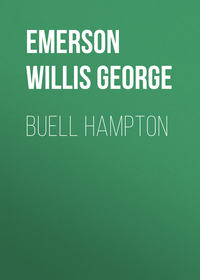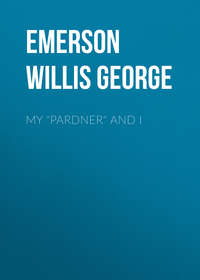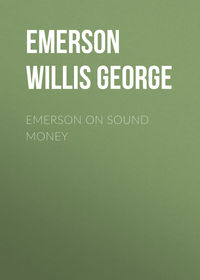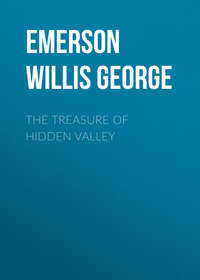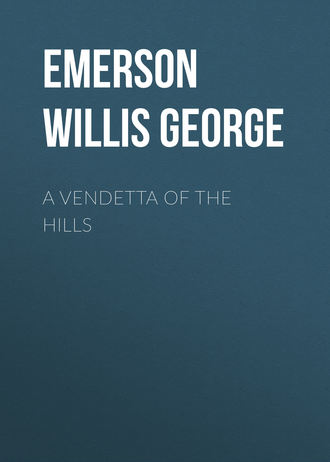 полная версия
полная версияA Vendetta of the Hills
Munson also was cogitating the change in his own outlook that had been brought about by the mailing of the letter of resignation to army headquarters. He was recalling the many years he had striven to reach the lieutenancy now voluntarily surrendered – of his youthful zeal and ambition for an army career which had been powerless to withstand the witching call of the West. And although Grace Darlington’s act of putting the letter in the post had been only the last feather to tip an evenly balanced scale, he could not but feel that thereby this beautiful girl of the West had entered into his life and into all his future plans, hopes, and aspirations. The thought gave him joy; he was more pleased than ever that the decisive step had at last been taken.
Arriving at the store, they found old Tom Baker seated on a dry goods box, while Buck Ashley leaned against the counter, waiting for the stage coach and the mails. Already two or three others were beginning to congregate under the trees, in readiness for the distribution of letters and newspapers.
“Hello, Dick,” called out the sheriff, “I heard of your scrap yesterday morning with that young ne’er-do-well, Marshall Thurston. My God, I’m glad you gave him hell.”
“Please don’t speak about it,” replied Willoughby quietly. “That was my affair and mine alone. I guess we can find some more agreeable topic.”
“Wal,” drawled Buck Ashley, “Tom here was just a-tellin’ me a yarn that’ll interest both you boys a heap, or the lieutenant at all events, for he’s new to these parts and don’t know the local hist’ry yet. Of course I’ve heard the story before, but not all the pertic’lars the way Tom can tell ‘em. And its a dangnation good story. So start from the beginnin’ again, Tom.”
Thus addressed, the sheriff, after taking a bite from his tobacco plug, began:
“The yarn has to do with the old-time bandit Joaquin Murietta, about whom we were speakin’ the other morn in’. Well, the way it all happened was this: On a neighboring ranch, over Ventura way, beyond the Lagunita Rancho, owned at that time by Senor Olivas, a rich cattle dealer comes down from ‘Frisco to buy a bunch of beeves. The stock had all been driven up on a mesa near the Olivas ranch house, and for several days the herders had been cuttin’ out the cows and the young calves from the steers, ‘cause this feller was only goin’ to buy the steers.
“The great herd was bellerin’ and pawin’ in a big cloud of dust, through which the vaqueros – cowboys, you know, lieutenant – could be seen ridin’ round and round. Of course roundin’ up cattle is always more or less excitin’ work, but this rich chap had come down from ‘Frisco with his saddle bags bulgin’ out with gold, and this sorta added a mighty sight to the interest of the doin’s. Part of the bargain was that the deal was to be for spot cash, all in gold, too, mind you, and it was arranged that the buyer and Senor Olivas were to take their stations at one side of the narrow gate, and every time a steer was driven through that gate a twenty-dollar gold piece was to be tossed into a big bag which Senor Olivas was holdin’.
“They do say as how the work continued all day, from early mornin’ until dark, afore the last blamed steer passed that ‘ere gate, and they claim that there was eighty thousand dollars in the Senor’s bag as pay for the day’s drive. They say, too, that Joaquin Murietta, disguised, was one of the vaqueros doin’ the drivin’. Anyway that very night old Olivas was waked up mighty abruptly by feelin’ the cold nose of a revolver shoved against his own nose.
“Well, the long and short of it all was that Senor Olivas and his wife were both gagged and bound hand and foot, while Murietta ransacked the house, found the strong box and carried away every blamed gold coin that Olivas had received for the sale of his steers. The outlaw succeeded in makin’ his escape into the Tehachapi mountains with his cut-throat gang, and they found a hidin’ place in the robbers’ cave that is somewhere hereabouts on the San Antonio Rancho. It sure was as slick a piece of rascality as was ever pulled off in the old lawless days.”
“Well,” observed Buck Ashley, as he shook his head reflectively, “I’m assoomin’ some of the cowboy fellers around here will find that cave one of these days. I’ve put in a good many Sundays huntin’ for it myself.”
Just then there was the sound of horses’ hoofs outside, and a moment later Jack Rover strolled into the store. Over his shoulder was slung the big leather bag for the rancho mails.
“Hallo, everybody,” was his greeting. “I’m ahead of time Buck, but the stage will be here in five minutes. I saw its dust above the ridge. I hear, lieutenant,” he went on, “you’re going to stick to the West and be one of us.”
“Quit the army?” exclaimed Tom Baker in surprise.
“That is so,” replied Munson. “California has fairly got hold of me, and I intend to make my home in the West.”
“Then you just stick here, young man,” said the sheriff, rising to his feet and extending his hand. “California is the pick of the States, and our valley the pick of California. Don’t you forget it. We’re proud to welcome you as a new resident.”
“That’s what I say, too,” concurred Buck Ashley, cordially.
Munson smiled. “Well, I don’t know if you can put me in the resident class all at once,” he observed, diffidently. “Guess I’ve got to join the cowboy brigade first, if Dick and Jack here will break me in.”
“Sure thing,” assented Jack Hover. “You’re a good rider now – for an army man.”
“An ex-army man,” corrected Willoughby, laughing.
“It strikes me we should put you in as postmaster, Munson,” suggested the sheriff, a sly gleam of mischief in his eye. “Buck Ashley here is growin’ old.”
“Yes, but not too old to hold down his job till your tombstone’s in the cemetery, Tom Baker,” retorted the storekeeper, with a grin. “No man takes the Tejon postmastership while I’m alive,” he added defiantly.
“I’m forewarned and won’t apply for your job, Buck,” laughed Munson. “But here comes the stage, so show your spryness, old fellow, by getting us our mail.”
CHAPTER VIII – A Letter from San Quentin
BUCK ASHLEY had retired into the partitioned-off section of the store that formed the postoffice, and was busy stamping and sorting out the mail. The scattered loiterers outside crowded into the building expectantly, and the local parliament was in session. Amid the buzz of conversation Willoughby could not but hear his own name mentioned, coupled with that of Marshall Thurston. He understood quite well that all manner of gossip was flying around in regard to the quarrel at the round-up. But he remained stoically indifferent, shut his ears, and leaning against the counter busied himself with an old Saturday Evening Post that had been lying there.
At last the wicket was shoved up with a bang, and those present began to move toward the little aperture through which Buck Ashley proceeded to hand out correspondence and newspapers. One by one the throng melted away. Jack Rover was examining the big bunch of mail for San Antonio Rancho as he stowed it into the letter bag. Munson was opening and gleaning the contents of two or three letters that had come to him from New York. Dick Willoughby continued his reading, unconcerned; Jack would pass over any correspondence for him. Old Tom Baker had not risen from his accustomed seat on an empty box; he had few correspondents, and the mail did not worry him, although he invariably assisted with his presence at its distribution.
These four were now the only ones in the store besides Buck Ashley, who still remained behind the partition. At last the postmaster appeared, holding in his hand an open letter. His face showed great agitation as he glanced around to take stock of those who might be present.
“Say, boys,” he whispered in a mysterious manner, as he held up the letter, “this is the most dangnation extr’ornery thing that has ever happened to me. You’re just the bunch of fellers I’d like to consult. Close the door, Tom.”
“What’s up, Buck?” asked the sheriff as he rose to comply. “You look as if you had the ague shakes.”
“No ague in this here land of California,” laughed Jack Rover. “Is it a proposal of marriage you’ve been getting, Buck?”
“A derned heap better’n that. God ‘lmighty, boys, this may mean millions for all of us. Shoot the bolt, Tom; I’ll hand out no more groceries tonight. Come close together, all of you. You read the letter aloud, Dick. My hand’s a-tremb-lin’, and I can’t get the Frenchie’s lingo just right.”
“The Frenchie?” echoed Tom Baker in puzzled surprise.
“It’s a letter from Pierre Luzon,” explained Buck.
“Good God!” The sheriff was now as deeply stirred as his old crony.
“The bandit scout you were telling us about the other morning?” exclaimed Jack Rover, also fired with excitement.
“I thought that fellow was in San Quentin for life.” remarked Munson, composedly.
“Wal, and ain’t this letter from San Quentin?” retorted Buck. “See the headin’. But Dick’ll read it aloud. I feel clean knocked out.” And the old man sank back on his chair behind the counter.
The four others were now clustered around Dick Willoughby. The latter, deputized to do the reading, had nonchalantly taken the epistle from Buck Ashley’s trembling hand. While the others were speaking he had bestowed a preliminary glance, and from his lips there escaped a murmur of surprise.
“Great Caesar!” As he uttered the ejaculation Dick sat up, keenly alert.
“Well, what’s it all about?” inquired Munson, by this time the only cool man in the bunch.
“Read, read!” cried the storekeeper hoarsely.
Dick Willoughby began:
“Mr. Buck Ashley, Storekeeper, Tejon, California.
“If God in His goodness permits this letter to come to your hands, remember it is from old Pierre, the Frenchman, who used to be about your store sometimes a half a day at a time, smoking his pipe. You never knew much about me or where I lived. But I will tell you.
“I am an old man now – very old. I was born in the South of France, came to this country in the ‘40’. and entered into the service of Joaquin Murietta, who was one great man, but a big bandit. Peace to his soul! Well, he was good to me, and I was faithful to him, taking care of the cave, the big grotto, the cavern among the Tehachapi mountains where he many times hid from the sheriff’s posse, and also, where he brought all his gold to stack up and keep from everybody.
“You also know Don Manuel, him whom the people call White Wolf. Well, once when a boy, Don Manuel he save Marietta’s life from the sheriff by helping him to escape from one close place. Murietta was very grateful, and one day he bring the boy to the grotto cave, and there I see him and like him very much. That was while Murietta still lived.
“Afterward when the little boy grow up and was one man, and turned bitter against the gringos because they wrong his sister, Senorita Rosetta, and his old father and mother die of grief, he say to me, ‘I will become a bandit like Joaquin Murietta.’ He came to the cavern one night and tell me and say, ‘You be my servant.’ So I say, ‘All right,’ because Don Manuel one brave man.
“So that night of the great stage robbery over near Lake of Tulare, I hold horses. That’s all I do, but all the same they put me in this horrid prison, and here I am. The other two men, Felix Vasquez and Fox Cassidy, were shot by the posse and I have been told by a Portugee in the jail here about the White Wolf being killed away north in Seattle, and he is no more.
“Don Manuel de Valencia, he was one great man. Peace to his soul!
“I am alone. I want to get away from this terrible prison. I have promised one of my guards – a good Frenchman who comes from my town in France – $5,000 in gold if he can secretly get this letter into postoffice to you and get me away from this living hell. You do this and I show you the cavern. Nobody knows where it is but me.
“Come and get me, please, my good Mr. Ashley, come, and may the spirit of the Virgin Mary reward you. All I say here is truth. You come get me and I show you the secret grotto. I show you the great stacks of gold hidden by Joaquin Murietta and Don Manuel. Also the sand-bar in the hidden stream where Guadalupe gathered up much gold.
“I beg and pray you to keep what I say in this letter secret. I am old and weak and sick. Come and get me.
“Obedient servant,
“Pierre Luzon.”
“Ain’t that just one hell of a letter, boys?” exclaimed Buck Ashley.
“Gospel truth, every word,” cried Tom Baker, emphatically.
“It certainly reads like the truth,” concurred Munson.
“Then what are we going to do about it?” asked Jack Rover.
Dick Willoughby spoke now with the quiet and quick decision that marks the leader of men:
“What we will do is this. We five are partners in this secret, and, if Buck is willing, we’ll play the game together for all it is worth. To begin with, we’ll put up one hundred dollars apiece to send Tom Baker to Sacramento. He will try to get a pardon or a parole for Pierre Luzon.”
“That can be managed,” assented the sheriff. “I’ve got a political pull, you know, boys.”
“Well,” continued Dick, “we’ll bring old Pierre here and we’ll get from him the information he promises about the secret grotto.”
“Not forgetting Guadalupe’s placer mine,” interjected Jack Rover.
“Everything will be attended to in its turn,” replied Dick. “One thing at a time, and the first thing to be done is to get the Frenchman out of San Quentin. When can you start, Tom?”
“The day after tomorrow.”
“Well, we’ll have the cash ready for you by tomorrow night. You must bring Pierre Luzon here without anyone else besides ourselves knowing his name or getting next to him.”
“I’ll fix up a cot for him in my own room behind the store,” suggested Buck Ashley.
“That’s a good plan,” assented Dick. “When the Frenchman’s here, it will be time then to discuss our next move. Meanwhile, it’s an honorable promise of secrecy all round, and to begin with I give my word.”
While speaking the last words, Dick solemnly raised his hand, and each man in turn followed his example as he gave the pledge required.
CHAPTER IX – Tia Teresa
TEN days had passed and the count of the stock on San Antonio Rancho had been completed, every canyon searched, the last wandering maverick roped and branded, the number of fat beeves accurately estimated. Three members of the Los Angeles syndicate had arrived in a big automobile and remained over night at the ranch house. Most of the time they had been closeted with Ben Thurston in his office, and had finally taken their departure without exchanging a word with anyone else on the rancho. Nobody knew whether the deal had gone through or not, but rumor said that, after some disagreement on the first day, terms had been arranged next morning.
Dick Willoughby, although he discussed the question with no one, made his own inferences. The very fact that the visitors had not made any inspection of the property proved that they already knew it thoroughly well. The counting of the cattle and horses had been the final factor in the negotiations, and the figures had enabled the deal to advance a further stage toward completion. Ben Thurston might fool himself about easy option money put up only to be forfeited, but Dick Willoughby was not fooled. The days of closer settlement in California had come, and these Los Angeles men were the most enterprising and skilful subdividers in the West. They dealt only in big propositions, and after mopping up all the available tracts in the southern end of the State, were extending their operations northward. This vast so-called “Spanish grant,” an empire in itself, had no doubt for several years been in their eye, and now they were prepared to handle the San Antonio Rancho with the lavish expenditure it deserved and required to transform the great sweep of cattle range – rich agricultural land, as the luxuriant native grasses showed – into smiling orchards and alfalfa farms, each provided with the irrigation water which intelligent conservation would ensure in abundance.
Dick knew in his heart that the era of transformation had at last come, that the roaming herds were to be pushed back into regions more remote, that homes and schoolhouses and garden cities would soon be dotting the landscape, that the passing of Ben Thurston, the cattle king, and of his hard-riding, devil-may-care vaqueros was at hand.
Yet Thurston spoke no word – in fact, he seemed to be more grouchy and taciturn than ever. Not even his son Marshall was in his confidence, for the young man was seldom with his father, preferring to spend his time in the drinking saloons and dance halls of Bakersfield, where the activity of oil-developing operations attracted all sorts and conditions of men, among whom the dissipated decadent had readily found friends to his liking.
Ben Thurston who had gone the pace himself in his early days, did not seek to interfere with his son’s pursuit of pleasures, but he had very promptly squelched any interference from Marshall with his own business operations. On the evening of the quarrel with Dick Willoughby at the round-up, Marshall had attempted to tell his father about the affair and suggest Dick’s dismissal. But the old man had at once silenced him by saying: “Why, damn you! I brought you out to this country to enjoy yourself and not to get into trouble. So far as Willoughby is concerned, I can’t afford to quarrel with him. He is my foreman, and I am right in the midst of a big business transaction. So just you mind your own business, my boy, and leave him alone.”
Accordingly, Marshall Thurston, a coward at heart, had not sought to pursue the feud singlehanded, and Dick had seen but little of him during the rest of the mustering work. When they did happen to meet, it was a case of a black scowl of hate from the one and a contemptuous smile of indifference from the other. And so the days had passed until the task was finished.
It was the Sunday morning that had been fixed for the visit to the home of Mr. Ricardo Robles, when the cattle foreman could at last conscientiously take a day of recreation. With the first break of dawn he and Munson were in the saddle, for they had been invited to breakfast at La Siesta before starting with the young ladies on the ride through the oak forest.
The visitors arrived early, but not too early for their hostesses. Grace and Merle were waiting to welcome them in the portico, looking more charming than ever in their neat riding suits of khaki.
“We saw you cross the bridge,” declared Grace, “and mother has gone in to order breakfast to be served. You must be hungry after your early start.”
“Oh, Sing Ling didn’t let us go without a cup of coffee,” laughed Dick. “But I fancy we’ll do full justice, all right, to the bountiful fare of La Siesta.”
It proved to be a delightful meal in every way, the viands seasoned with gay repartee and laughter. A full hour had sped before Dick recalled the real object of the day’s excursion.
“We usually walk to Mr. Robles’ place,” remarked Merle. “It is only a mile or so by the short cuts up the hill, but by the winding road it is very much longer. So we ordered our ponies.”
“I see,” smiled Munson, “to prolong the pleasure of our foursome among the oaks.”
“Not at all, sir,” retorted Grace. “The climb on foot is a stiff one, and we knew that you must be out of condition from the lazy life you are living.”
“I am only waiting for Willoughby to give me a cowboy’s job,” replied the ex-lieutenant.
“I don’t know if there will be any cowboy jobs going,” observed Willoughby. “It’s my belief that San Antonio Rancho is sold and is going to be broken up into small holdings.”
“Oh, what a pity!” exclaimed Merle.
“From one point of view, perhaps,” answered Dick. “But from a hundred other points of view, what a blessing! There will be a dozen happy homes for every steer the range now feeds!”
“But La Siesta will remain just as it is,” cried Grace.
“That will be all right,” replied Dick, gallantly, “It’s already a happy home.”
The ladies smiled pleasantly.
“Then this will mean the elimination of Mr. Ben Thurston,” observed Mrs. Darlington.
“The greatest blessing of all,” declared Merle, clapping her hands. “You see, I am already converted to the change, Mr. Willoughby,” she added merrily.
“But what about my job?” asked Munson in mock dolefulness.
“Consult Mr. Robles,” laughed Grace. “He may take pity on you, and find you a place as handy man on his estate.”
In merry mood they all sallied forth. The saddle horses were waiting, and standing beside them was an elderly Spanish woman.
“Tia Teresa, Mr. Munson,” said Mrs. Darlington by way of introduction.
Munson had often enough heard the name, and in answer to an inquiry, Willoughby had told him that the old dame had been the personal attendant of the two young ladies ever since they could remember. Tia or Aunt Teresa was now more a friend of the family than a servant of the house, and, taking her hand in salutation, Munson treated her with the affable courtesy that was her due.
“I am glad to make your acquaintance,” he said, raising his hat.
Tia Teresa looked pleased. Despite her seventy years, she was a buxom and splendidly preserved woman, and there was still the flash of youthfulness in her big dark eyes.
“You will look after my little girls,” she said, as she gathered together the folds of her black lace mantilla. “By rights I should be coming with you, too,” she added, in the manner of a true Spanish duenna.
“You forget that we are home again – in free America,” laughed Merle as she settled herself in the saddle.
“Too free, I sometimes think,” rejoined Tia Teresa. “But there is safety in four,” she added, turning with a smile to Mrs. Darlington.
And as the young folks rode away she waved them a pleasant adios.
CHAPTER X – The Home of the Recluse
AT a gentle pace they wound their way through the forest of magnificent old oaks.
As for Munson, riding by Grace Darlington’s side, the miles were the shortest he had ever before traversed. It seemed only a few minutes before the red tiled roof and towers of a house built in the California Mission style were gleaming through the trees only a short distance ahead.
Great oaken doors closed the arched gateway, but at the clatter of hoofs and the sound of voices, a little peep-hole wicket was withdrawn. The inspection by unseen eyes apparently was satisfactory, for a moment later a postern was opened, and two men, Mexicans obviously by their garb and deferential manner, emerged to take and lead away the horses. Within the patio stood Senor Robles, his usually grave face lighted by a smile of cordial welcome.
“Let me tell you, young men,” he said while shaking hands, “that while Grace and Merle are quite at home here, you are the very first strangers who have passed through my portals.”
“Strangers no longer then,” said Dick, good-naturedly.
“Precisely,” replied Mr. Robles, “or you would not be here. But I foresee that all of us are going to be very close friends. Isn’t that so, Grace, my dear?”
“I’m sure I cannot say,” replied Grace, with a smile of demure innocence toward Mr. Munson. Then she turned to Mr. Robles with a roguish twinkle in her eye. “But I’ve news for you. Mr. Munson has resigned from the army and is looking for a job.”
“Both facts are already known to me,” answered Robles, smiling.
“Oh,” exclaimed Grace, “one can never surprise you, Mr. Robles. Although you live the life of a hermit, you seem to be always the first to learn everything that is going on.”
“A hermit, my dear, need not necessarily be out of touch with the world,” replied Robles, playfully pinching her ear. “And now, Mr. Willoughby, you came specially to see my pictures. Lead the way, Merle. Gentlemen, I say again – welcome to my mountain home.”
They lingered awhile in the patio to admire the marble columns of the cloister that ran all around, the playing fountains at each of the four comers, with groups of symbolical statuary, the wealth of beautiful shrubs and flowers. On the side opposite to the gateway rose a tall tower, fashioned like the campanile of an Old Mission and crowned with bright red tiles.
“We shall ascend there later on,” remarked Mr. Robles, following Dick’s upward glance.


